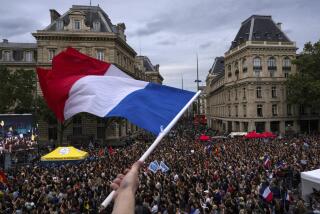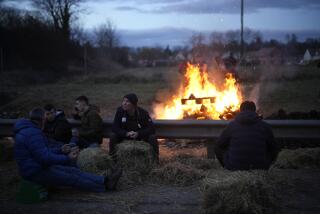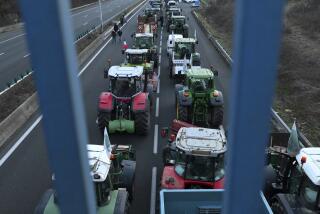‘The Week of the French Song’--It’s Mostly Blues Over Transit and Power Strikes
- Share via
PARIS — The French government has designated this week “The Week of the French Song,” a celebration of the French ballad in the face of competition from American rock.
But for most French it has been a dark week of discontent. If anyone is singing, hardly anyone is listening.
The French are struggling with strikes on the railways, the Paris subway and bus lines, the national electricity company, the seaports and, to some extent, the post office. French life is full of harassment these days, some of it annoying, some of it costly, some of it dangerous.
The problems reek of politics. Premier Jacques Chirac, who has seen his popularity plummet in the past two months, is trying to reverse the trend and stand fast against what he calls the inflationary demands of the privileged workers in these government-run public services.
The Communist Party of France, almost moribund for several years, is trying to revive itself by seizing leadership of the strikes from genuinely discontented workers.
To make matters worse, lieutenants of Chirac are calling on the exasperated public to take to the streets next week and demonstrate against striking workers. Chirac said Friday that this would be unwise, but he failed to call off his lieutenants. The mood is dark and ugly.
The electricity strike has probably provoked the most fury. Industry, which has scurried around for three weeks to find a substitute for railway transportation, cannot find a substitute for electricity. The power cuts vary in duration and come intermittently, whenever engineers for the state-owned utility shut off power to an area that is trying to use more power than can be supplied at that time.
Small shopkeepers make the problem obvious. Bakers, unable to use ovens to bake bread, have taken their gooey dough to local electricity offices and stuffed it under the door or thrown it through open windows.
Shoemaker’s Woes
A neighborhood shoemaker in Paris pointed to piles of unrepaired shoes Thursday and apologized to a customer for failing to finish on time.
“I’m sorry,” he said, looking harried. “I can’t get anything done.”
A 70-year-old woman who runs a tiny newspaper and magazine shop lined up in a crowded hardware store to buy a flashlight and batteries.
“I am tired of stumbling around in the dark,” she said.
But by then the hardware store had sold all its batteries.
Employees walked out of a small movie theater near the Champs Elysees and told a passer-by looking at the posters: “Don’t bother. There won’t be any movies today.”
At a school where children had eaten cold lunches for most of the week, the authorities sent a note to parents urging them to dress their children warmly because there was little heat. Some hospitals have also complained about power cuts.
Traffic Turmoil
Traffic lights suddenly stop flashing, and the result is turmoil, for the streets are unusually crowded with commuters forced by the transport strike to take to their cars.
The French have a rule, “priority to the right,” and where there is no traffic light, a driver should yield to any car trying to cross from the right. But the French also have a certain disdain for rules, and many drivers refuse to yield, increasing the danger of snarls and accidents. Pedestrians now find crossing a major boulevard like the Champs Elysees even more frightening than usual.
Normally, Paris has one of the world’s most efficient public transport systems, but it has been crippled by the strike. Some subway stations are still operating, but the trains come far less often than normally, and the rider has to shove rudely and roughly against a mass of bodies to make space.
Bus passengers must do the same. Strike-smart riders have learned that there is more space if they try to get on at the rear exit rather than at the front entrance, but even that is a struggle. It may be wiser to walk. The bridges across the Seine are crowded these days with pedestrians.
Parking Nightmare
With both the railways and the suburban subway lines on strike, many commuters have been forced either to spend two hours getting to work in the morning or to take their cars into the city. This has turned Paris into a parking nightmare. Many drivers simply drive onto the sidewalk and park there. Chirac, who is also the mayor of Paris, has called on the police to show tolerance toward drivers.
Most people have not felt much obvious discomfort because of the port strikes, which are ending, and the post office strike, which was not supported by many postal workers. The rail strike, which has now entered its fourth week, has been with France for so long that the public, but not industry, has grudgingly adjusted to it.
Unlike Americans, the French like and use their railways. But for most French, the Christmas holidays were only dampened, not ruined, by the rail strike as tour operators scurried around to hire buses as substitute transportation. A five-to-six-hour train ride to or from the ski stations of the French Alps became a 12-to-14-hour bus ride, but at least there were a few days of skiing in between.
It is hard to judge the direction of the mood of the French. A large number seem to be more resigned and troubled than angry. And those who are angry do not always make it clear whether they are angry at the strikers, the government for failing to end the strikes, or both.
Most of the muttering at the moment seems to be aimed at the strikers. Chirac, in his political battle, is surely counting on that. But people in a dark mood, if it continues for long, might lash out at everything they see.
More to Read
Sign up for Essential California
The most important California stories and recommendations in your inbox every morning.
You may occasionally receive promotional content from the Los Angeles Times.













